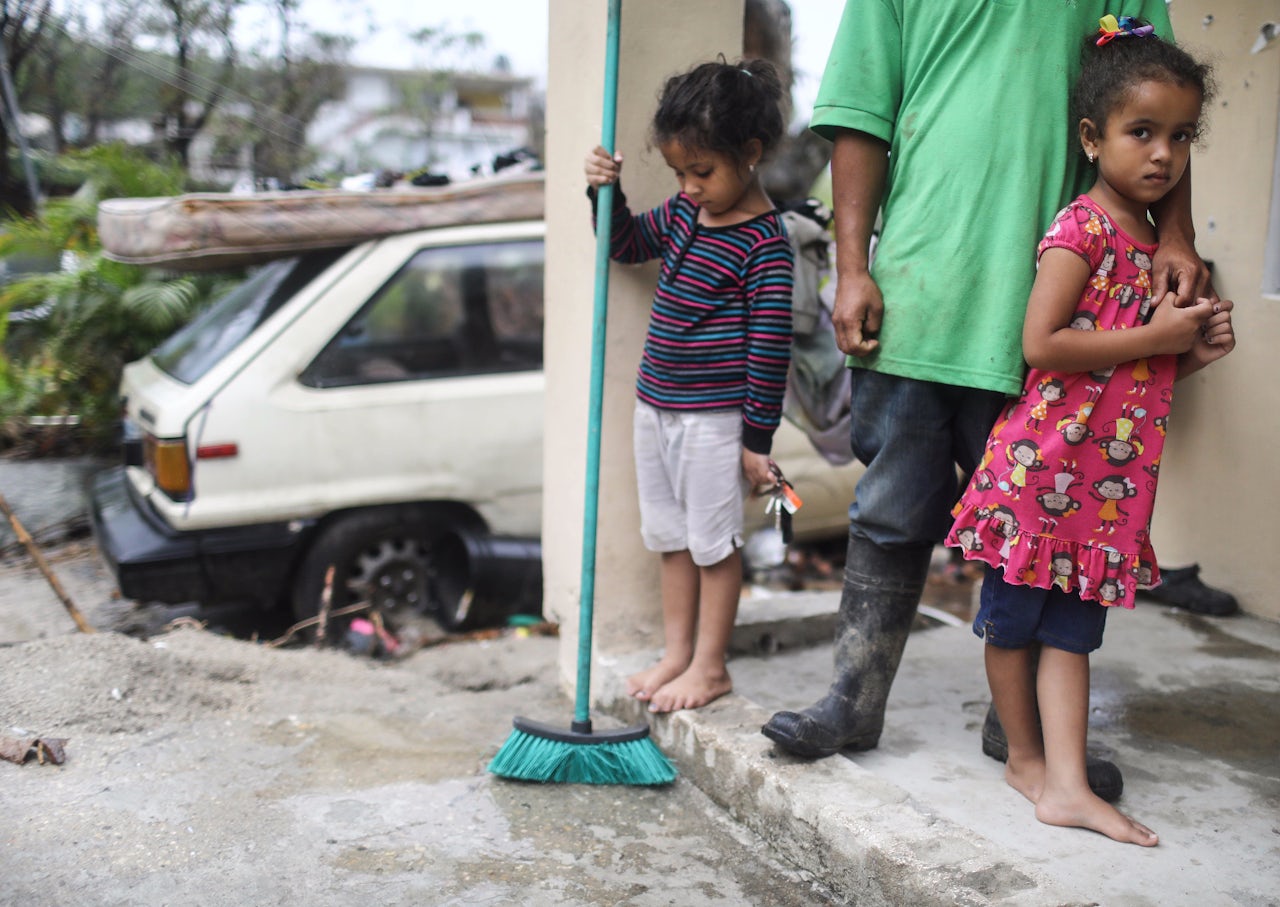On September 27, the chairman of President Donald Trump’s inaugural committee announced three $1 million donations to the Salvation Army, Samaritan’s Purse, and the American Red Cross to help with hurricane relief. “The surplus of these privately donated funds will be put to great substantive use for relief victims throughout the heartbreaking regions of America impacted by the recent catastrophic disasters,” the chairman, Thomas Barrack, told the New York Times in an email.
But Trump’s donation (if you can call it that, considering it’s coming from other people’s money) was either an empty gesture meant to distract from the administration’s enormous screw-up in Puerto Rico or to assuage the president’s own comically fragile ego (or both). But it was also representative of a longstanding thread of conservative thought that has argued that charity, and particularly Christian charity, is a suitable stand-in for public resources and services — whether it be welfare, health care, education, or yes, even disaster relief.
As Trump and his predecessors’ failures show, this is not true, has never been true, and will never be true.
The conservative willingness to pawn off public services such as recovery efforts to private organizations can be traced back to John Locke, who wrote that charity is a “duty, not of justice (save in extreme cases), but of Christian charity – a duty not enforced by human law." (It’s unclear whether or not he would consider what’s happening in Puerto Rico an “extreme case.”)
We talked about charity our daily podcast, The Outline World Dispatch. Subscribe on Apple Podcasts or wherever you listen.
In modern times, 1964 Republican presidential candidate and longtime U.S. Senator Barry Goldwater outlined it in his foundational text for the conservative movement, The Conscience of a Conservative:
Let welfare be a private concern. Let it be promoted by individuals and families, by churches, private hospitals, religious service organizations, community charities and other institutions that have been established for this purpose. If the objection is raised that private institutions lack sufficient funds, let us remember that every penny the federal government does not appropriate for welfare is potentially available for private use — and without the overhead charge for processing the money through the federal bureaucracy. Indeed, high taxes, for which government welfarism is so largely responsible, is the biggest obstacle to fundraising by private charities.
Goldwater got shellacked in the 1964 presidential election by Lyndon B. Johnson. But his brand of economic libertarianism became the defining feature of the post-Nixon Republican Party, and eventually culminated in the election of Ronald Reagan in 1980. The first federal budget Reagan signed included $35 billion in cuts to public spending, summarily booting people off of life-saving programs like Medicaid, food stamps, and the now-defunct Aid to Families with Dependent Children program. (Reagan did this, of course, by pushing the racist and fictional “welfare queen” narrative, to show the supposed horrors of fraud and abuse.)
Echoing Goldwater in a 1981 speech to the National Alliance of Business, Reagan pushed back on the notion that the budget cuts were inhumane. “The size of the Federal budget is not an appropriate barometer of social conscience or charitable concern,” he said. “I have never found an agency, a program, a piece of legislation, or a budget that was adequate to meet the total needs of human beings. Something is missing from such an equation. I believe that something is private initiative and community involvement.” In another speech that year: "We've let Government take away many things we once considered were really ours to do voluntarily out of the goodness of our hearts and a sense of community pride and neighborliness."
The results were at once predictable and devastating. By Reagan’s second term, it wasn’t just nonprofits that were groveling to corporate donors for help filling the craters in service created by his economy, but even some state governments as well. “'With the cutbacks of Government money to human service agencies,'' an executive for charitable giving at Gannett told The New York Times in 1985, ''all the foundations and corporations have been getting more of these requests because the needs are immense and the problems of the poor are getting worse.”
By Reagan’s second term, it wasn’t just nonprofits that were groveling to corporate donors for help filling the craters in service created by his economy, but even some state governments as well.
As with today’s GOP, Reagan’s disdain for public services extended to disaster relief. The administration opposed a 1988 push spearheaded by then-Congressman Tom Ridge — a Republican who later became the first Homeland Security secretary under George W. Bush — to increase emergency assistance spending. “The Administration believes that any legislation revising the Disaster Relief program must, at a minimum, be deficit neutral,” Reagan said in a press release, although the federal government operated at a deficit through most of his presidency. (He ultimately signed the bill.)
Although the Goldwater-Reagan notion of corporate goodwill being restrained by onerous taxes was proven wrong as soon as it was tried, it’s remained pervasive in American politics. Democrat Bill Clinton and a Republican Congress effectively destroyed welfare in the mid-’90s with the Personal Responsibility and Work Opportunity Act, replacing the AFDC with the bureaucratic obstacle course of Temporary Assistance for Needy Families; companies, however, got tax subsidies if they were willing to hire welfare recipients. Even the crowning Democratic policy achievement of the last fifty years, the Affordable Care Act, was itself a public-private partnership with health insurance and drug companies, rather than a straightforward public system such as the U.K.’s National Health System or the proposed Medicare for All system here.
It’s not just the politicians who have bought it. Reagan’s way of thinking about public services — that it’d be better if they were actually private services, with the ones you can’t make money off of handled by charities — has stayed prominent in American life, with conservative intellectuals gloating that they’re more charitable than liberals based on multiple studies that showed that being conservative and religious positively impacts charitable giving.
Even some liberals have accepted this framing. “Liberals show tremendous compassion in pushing for generous government spending to help the neediest people at home and abroad,” Times columnist Nick Kristof wagged in a 2008 piece. “Yet when it comes to individual contributions to charitable causes, liberals are cheapskates.”
The truth is more complicated. First, as an MIT study from 2013 showed, any evidence showing that conservatives give more can be attributed to the fact that they’re giving to religious causes, which are nonprofit entities, and there’s no evidence in either direction for how much “the poor” receive as a portion of those donations. And secondly, as a 2014 study by the Chronicle of Philanthropy showed, the wealthiest may have given more in raw dollars but gave much less of their share of income — a decrease 4.6 percent from 2006 to 2012 — than people who made under $25,000 a year, who increased donations by a total of 16.6 percent from 2006 to 2012.
It’s also worth pointing out that the organizations Trump’s committee is donating its money to have spotty records. Samaritan’s Purse, a charity founded and run by prominent Trump campaign surrogate Franklin Graham, once “held half-hour prayer meetings before showing” Salvadorans recovering from an earthquake “how to build temporary homes of metal and plastic provided by the American government.” Similarly, the Salvation Army was sued by current and former employees in 2004 for forcing employees — whose jobs were funded with public money — to adhere to religious standards. The group has also been known for being hostile to LGBTQ causes throughout the years, enough to cause the organization to launch a PR campaign based on testimonials from employees and people who have used Salvation Army programs.
Instead of relying on the kindness of the ultra-wealthy through charity or the efficiency of their companies through public-private partnerships, the solution to disaster relief should be easy: just fund public services.
The American Red Cross — the one organization given money that is not an explicitly Christian charity — might be the worst of them all. The Red Cross has a famously dismal track record of actually helping in a time of natural disasters; after the 2010 Haitian earthquake, for example, they raised nearly half a billion dollars. A ProPublica and NPR investigation showed that only six permanent homes were built, and a Congressional report showed that 25 percent of the money went to internal administrative expenses.
House Republicans yesterday unveiled a $36.5-billion emergency storm plan, which sounds like a large amount of money, but will be spread among the various recovery efforts in Texas and Florida as well as Puerto Rico and the Virgin Islands; combined, the cost of recovery from all of the hurricanes could cost up to nearly $300 billion. Not only that, but Puerto Rico’s biggest benefit will be $4.9 billion in “low-interest Treasury loans,” which will eventually need to be paid back even as the island is undergoing forced austerity imposed by an unelected “bipartisan fiscal control board.”
While the money will help — if it’s approved, that is — the island is still in a dire crisis: three weeks after Hurricane Maria touched down, 40 percent of the island still doesn’t have potable drinking water and just 15 percent has electricity. It’s been estimated that it could be months before power is restored for everyone there, which is already having tragic implications for health care in the country.
Instead of relying on the kindness of the ultra-wealthy through charity or the efficiency of their companies through public-private partnerships, the solution to disaster relief should be easy: just fund public services. This is not something that either private charity or loans can fix, but rather an extensive public investment into both recovery and infrastructure, to make sure the island is better prepared for the next hurricane. Raising taxes on the wealthy and corporations and asking them to pay their fair share — as well as cutting the defense budget — can provide the revenue that would only help places hit by hurricanes recover, but help them build something better and more lasting.
And more generally, Goldwater was wrong: welfare, and other public services like disaster relief and recovery, is a public concern. We’re a society, and a society needs to provide basic needs for its citizens, including relief in the event of a catastrophic disaster But in order for this to happen, we have to change the framing of the debate to reflect the fact that crowdfunding, private action, and the free market cannot alone do the job of helping people both live through and recover from a crisis like a hurricane, as well as through the unacknowledged crises of daily life that are the reality for this country’s poor.

